As a child I was indoctrinated into family belief systems like, “The rich get richer, the poor get poorer” and “You have to work hard and even then you probably won’t get ahead.” I didn’t recognize how fundamental these negative beliefs became to me until I went to college and my peers pointed them out. I had couched my negativity in terms of realism, what I believed was possible for a girl from a single parent, low-to-middle-income family in small town Virginia. But there are many forms of reality.
During college, I came to realize that the maternal side of my family connected to each other and the world through tales of pain and ailments. I know that wasn’t intentional; it was what they knew. Discussions went something like: “How are you doing? – Well my shoulder has been acting up… – What’s been going on? – So-and-so is in the hospital again… ” It was our way.
For many years now, since having this realization, I’ve been challenging the assumptions and beliefs with which I was raised and studying new ways of thought. And I am now very happy—because I choose to be.
Today I’d like to share three small mental shifts that changed my life.
Gratitude.
Gratitude has been monumental for me. Instead of focusing on what’s wrong in life, I now choose to honor what is going right. That could be as small as having adequate shelter and food, and sometimes it is those little things that get me through.
How does gratitude work in practice? I’ll share an example from my journal a few mornings ago:
“We’re supposed to drive to L.A. today but hubby is fried. He stayed up past 4am trying to get a feature done for work. Damn, what is it about the combination of him and this company that is so challenging? Life was never like this when he worked at HP. I knew working for a startup would change things, but I didn’t expect it to still be like this 2 1/2 years in. [I allow my feelings to flow onto paper for a bit, and then I consciously switch focus…]
“I’m grateful, really. I love my husband. I’m comfortable in our little home. We live in such a beautiful part of the country and have some great friends. Ok, I’m letting go of my anger at this situation. I let go of my frustration with my husband and his choices. Everything will be fine. I take responsibility for my own happiness and productivity. All is well in my world.” [That last phrase is a nod to Louise Hay, whose You Can Heal Your Life became one of my first new thought guides.]
When it comes to changing thought patterns, I think a journal is a great practice arena. Sometimes feelings can overwhelm our thoughts. By writing my thoughts down, I feel like I am better able to replace the inherent, negative beliefs with positive thoughts I choose.
Even before I made the mental shift to gratitude, I would use my journal to document negative thoughts. Then, when I was feeling calmer, I could look back at what I wrote and apply the, “Is this true?” filter.
My journal has been a safe place to explore immediate feelings and then consciously choose how I want to feel. With practice, I’ve learned to make this shift without the journal too, in the present moment. And if I really need it, I take a deep breath and then let it out slowly while recalibrating my feelings.
Staying present.
Staying present, my second mental shift, can be a toughie. It’s easy to let our minds wander to the past or future and lose sight of the only place we have power: this exact moment.
A lot of people say that worry is unproductive because what you worry about rarely comes to pass. Well, I don’t know about you, but I have an uncanny ability to make happen exactly what I worry about. So I’ve had to learn to let go of worries. But being married to a worrier has taught me that I’m not a big worrier by nature.
Instead I tend to look to the future as salvation and to the past with regret. I obsess over what I’ve done wrong, what I could have done better, and feel sadness about losses, both of people and opportunities. But doing that is also unproductive. My point of power in those situations was in the past.
Overcoming our tendencies to worry or obsess is difficult, I think. More difficult than choosing to be grateful, for example, but the act of choosing gratitude can help us stay present. When we’re expressing gratitude, we’re in the present, acknowledging our surroundings.
For example, right now I’m sitting at a granite countertop typing on my laptop in our cozy Topanga, CA vacation cottage and watching my husband make breakfast. I’m enjoying the warm sunshine and cool breeze blowing through the window screens, smelling delicious bacon, eggs, and sausage cooking, and listening to birds sing. As I fully experience this moment, I can’t focus on either the past or future, and that is a good thing. I am present.
Assuming other people mean well.
You probably know I’m a volunteer CASA, a court-appointed special advocate for foster children. People often ask me how I do that, how I interact with parents whose children have been removed from their care due to abuse or neglect. I’ll tell you what I told my supervisor during the initial interview, “I believe that people do the best they can with the knowledge and understanding they have in that moment.” And yes, just like the other mental shifts above, this is a conscious choice.
Let me put this another way: I don’t believe there are bad people. I think some people do bad things or make poor choices, but doing so doesn’t make them bad people. And yes, this applies to everyone, including those who are cruel to animals, abuse children, and commit acts of terrorism or extreme violence. These individuals too are doing the best they can with their current understanding of the world which, admittedly, may be tremendously flawed. But we are all human and we all have made poor decisions.
My faith in people doesn’t mean I think they should be freed from accountability for their actions, that we should all just hold hands and sing kumbaya. I absolutely believe that we should be held accountable for our actions.
I want to assure you that I am not approaching this stance from naïveté. I know that some people intentionally harm others, and I consider those situations to be cases of wrong thinking. Something they believe has led them to think their actions are necessary for the protection of themselves, their loved ones, or society—or they lack empathy. None of these alternatives makes them bad people, it makes them human (read: imperfect) beings.
But here’s the bottom line: What does the belief that others mean well do for me?
It makes the world a friendlier, more sympathetic place. It gives me hope despite the many challenges we face as a society and planet. It makes it easier to live a happy, healthy life.
What mental shifts have you made that improved your life? Are there any of mine that you implemented with success or would like to?
Cheers,

Last week I introduced you to one of my college documentary photography professor Viktor Kolář, and mentioned our semester-long project. Well, because it’s fun to dig up old work (ca. 1998), I decided to share some with you.
As I mentioned in the prior post, I’d originally planned to photograph people on public transit—something I was too uncomfortable to bring into being—so instead I contacted local dance schools. Having danced for 15 years and practically lived in a studio growing up, it was a comfortable environment for me.
My 5 years of French lessons, the language of dance, also proved instrumental to the project. When I first called local studios, my Czech language skills were too poor for me to convey what I was trying to accomplish. In a moment of inspiration, I switched to French and convinced one poor teacher in a remote part of Prague to allow me to visit and photograph her students.
For a few weeks I visited Mme. Alena’s studio to document her lessons. She’d made it very clear that she wanted me to focus on the girls and not herself but I managed to get her in frame on occasion because I was interested in the relationship between teacher and student(s). The girls were preparing for their annual revue and spent much of their time honing and perfecting their performances.
My time at the studio was brief but enjoyable. Before the semester concluded and I left Prague, I printed a bunch of photos and took them to the studio for the girls and their families. All were shot on film with natural light, uncropped, and most likely taken with a Canon EOS Elan.
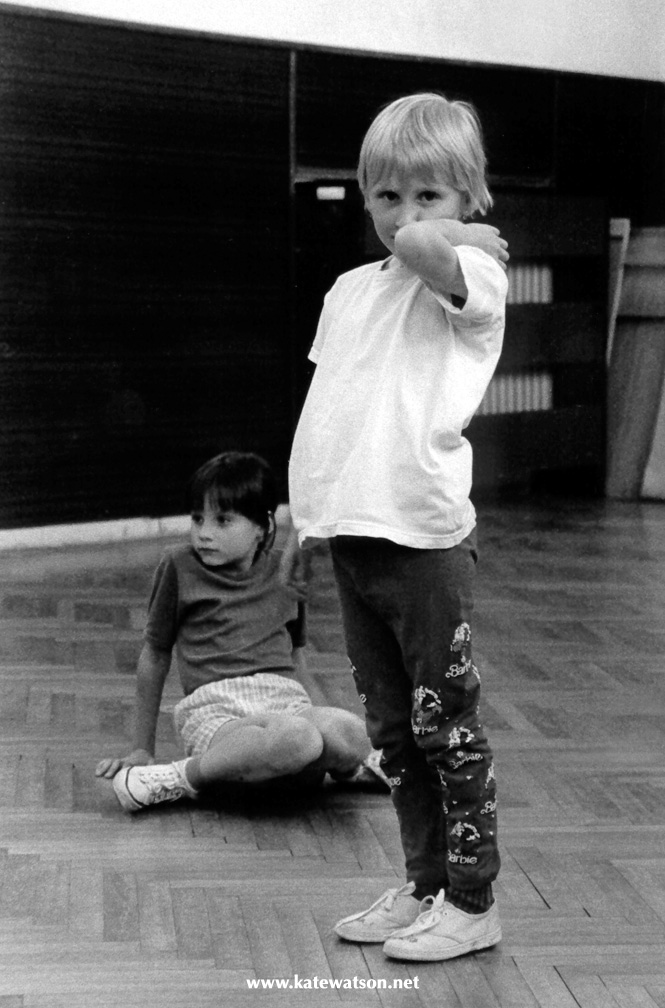 (c) Kate Rorer Watson. All rights reserved.  (c) Kate Rorer Watson. All rights reserved.  (c) Kate Rorer Watson. All rights reserved. In my journal on May 14, 1998 (yes, I still have it!), I wrote in French: I will miss Alena and her dance school. I really enjoyed Alena and the girls, and practicing my terrible French. The photos are rather good, not perfect, but I’ve been practicing and getting better.
I am very proud of myself for managing with [my boyfriend’s] help to find a Czech dance studio, to go there by myself and take decent photos, to converse in French while there, and to get to know some real Czechs here in Prague.
There you have it. My long-ago first documentary photography project, what I could find of it. I hope that added a fun dimension to last week’s post about my professor.
Cheers,

I’ve always been a Ms Fix It. It was (ironically) a problem in the early years of my career. I wanted to fix things that others didn’t necessarily view as problems. I wanted to make things better even if others viewed them as good enough already.
While I’m become a bit wiser in how I approach things over the years, my natural fixer tendencies are still alive and strong. And I’m ok with that, I’d rather be part of the solution than the problem.

What I’d like to talk about today is how often I’m encountering people who just want to talk about the problems and leave the solutions to other folks. Cases in point:
- I had lunch today with a business contact. I’d asked him to share his experiences working in an industry I was unfamiliar with but, instead of sharing his knowledge, he spent our time together picking apart a new venture idea I’ve been brainstorming and telling me all of the problems with it. On the one hand, having someone point out problems helps me brainstorm more solutions BUT never did he present any solutions.
- I provided a photo to a friend for use in some marketing materials. Her graphic designer said my file was unacceptable: too small, pixelated, etc. It was a straight-out-of-the-camera Canon RAW file from a 5D, a file type and size I’ve printed at very large scale without issue. Again the graphic designer posed no solution to our mutual problem. I had to go around her and talk directly with a commercial printer to prove the file was usable. She then convinced the printer it wasn’t. I talked to the printer again, and the printer agreed to a test print. Turns out my photo printed just fine. All’s well that ends well, of course, but there was a lot of unnecessary hassle and drama to get there.
I had a couple more examples lined up but I think these two convey my point. Is anyone else seeing this tendency? Has it become commonplace to complain about problems without posing solutions? What’s up with that?!
Personally, I never want to hear a problem without hearing at least one solution. It may be a bad one but at least it shows you’re trying. Or, if you’ve truly got nothing, then at least show up for a brainstorming session.
At a former job, I worked with an attorney who used to just tell me ‘no’ when I asked if we could do something. Yep, just no. What I wanted to hear, if the answer was in the negative, was, “No, we probably can’t do that, but what about …” How hard is that? It takes just two minutes of brain power.
We have a lot of problems impacting our planet, our country, our cities, and our neighborhoods, impacting humanity at large. We all know this. And the solutions aren’t for others to figure out. We are all capable of posing solutions. In fact, your solution may be better than someone else’s but no one will know unless you show up to the table. So, I ask you: Are you part of the problem or solution?
If we all spent less time complaining about problems and more time brainstorming solutions, imagine what a positive impact we could have.
Do you have a better solution? Share away, friend.
Cheers,

This week I’d like to introduce you to Czech documentary photographer Viktor Kolář. If you haven’t heard of him, that’s understandable. When I stepped inside FAMU and wandered up the stairs to my first seminar in documentary photography with him, neither had I.
 Viktor Kolář, photographed by Jaromir Sliva According to Kant Books, “Viktor Kolář is the Czech Republic’s most important urban photographer, and is especially famed for his photo-chronicles of his hometown of Ostrava… [He] is the only Czech photographer to have received the Mother Jones International Photography Award (1991).”
 Ostrava 1968 (c) Viktor Kolář Kolář became my favorite photography professor during my semester abroad. His classes were often filled with laughter as he shared stories in his unassuming and accurate English while insisting that a Czech-to-English translator be on hand. He didn’t actually need one but he thought he did so we played along.
I took copious notes in his classes because the words that came out of his mouth were wisdom-filled and almost poetic. Unfortunately now, 16 years later, I no longer have my notes. I do, however, still have some of his handouts. They convey his manner of speaking well:
“If I come to understand the mechanism of my motivation to photograph, my inner sensitivity towards certain themes, whether they attract or provoke or promise an experience, there is some hope that I can come to understand my own self in terms of inclinations and potentialities.”
 1975 (c) Viktor Kolář “A documentarist’s work consists of 30% talent and 70% hard work. And ever-recurring doubts about the quality of what I am producing.”
 Ostrava 1967 (c) Viktor Kolář “Every man is an independently existing, self-contained world, guided by an impulse to live. Besides biological aging, suffering, happiness leave their mark on him the same as the stereotypes of every day on his life. The lives of people around us reflect our own life with its desires, disappointments, fulfillment…
 Ostrava 1978 (c) Viktor Kolář  Ostrava 1980 (left) and 1977 (right) (c) Viktor Kolář “The real masters of the document are at the same time masters of human typology. They know what becomes the face of man: ingenuity, dignity, joy, suffering, aggressivity. Motto: A face irradiated by real feeling is always beautiful.”
 Ostrava Paskov 1992 (c) Viktor Kolář “As far as possible I do the photographing alone, completely on my own, without anybody else participating. Just I myself establish contact with people or the environment. Experiences and expertise gained by this strengthen my motivation and boost my confidence.”
 1975 (c) Viktor Kolář It was because of Kolář that I embarked on my first documentary project. Originally I’d thought to do street photography, or rather, document people on the subway and trams, something I was too shy to attempt when the time came. Instead I photographed young dancers in training at a local studio. (More on that next week.)
For now, I’d like to close with a brief bio and some images of an amazing photo book he gave me:
  
From Fototorst: “A native of the coal and steel town of Ostrava, Moravia, Viktor Kolář (born in 1941) has been takingi photographs of his hometown ever since he was a boy. A brief period as an emigre in Canada (1968-1973) resulted in another group of photographs. Later, Kolář accepted the occasional commission, including one for a book on Prague, where, since 1993, he has been commuting to teach photography at the renowned FAMU film school.
“All his departures, however, are only digressions from his main theme, Ostrava. For Kolář it is not merely a strangely rough and ready, enthrallingly awful town, it is also his whole world, the place where he searches for universal themes.
“For about fifty years Kolář has been a shy yet tenacious observer of the highs and lows of human life in a single place, his universe, reflecting the changes in its landscapes and the faces and bodies of its inhabitants.”
For more of Viktor Kolář’s work, please visit his website.
Question for you readers: How are you liking the Artist of the Week series? Any special requests for my posts? Do you like to hear how I met or “found” an artist versus just hearing about their work?
Cheers,

I’ve freed myself from the word “should” and, today, I’d like to help you do it too.
Should is the very devil of a word, isn’t it?
“I should be…”
“She should know better.”
“He should take more responsibility for …”
“They shouldn’t let their kids do that.”

You don’t feel good about yourself or others when you’re living with shoulds. When you use it against yourself, it can create unnecessary stress, low self-esteem, and even depression and, when used against others, it can manifest strife.
When turned inward, should can start your gremlins chattering: “I should be working” turns into “You’re so lazy. What’s wrong with you? You’ll never amount to anything.” Yuck!
When turned outward, “she should know better” turns into “What is her problem? God, what a beeyotch. I’ve had it!”And studies show that venting your anger escalates situations rather than diminishes the stress.
Should and Ourselves
IMHO, there’s nothing constructive about should. But what can you do instead? Here’s what I do when I’m shoulding myself:
Reframe the statement. Instead of thinking “I should be washing dishes,” how about, “If I want the kitchen to be clean before I start dinner, I need to wash the dishes soon.” Ok, that gives you some options around it, right? If you don’t clean the dishes now, you can clean them immediately before you start dinner, order in some pizza, or just work with the mess. Now that’s constructive. 😉
Ask questions. Walk through the following series of questions to diagnose the dilemma. For example:
- Initial statement: I should be blogging.
- Why should I blog today? — Because I have a schedule to adhere to.
- Why am I not doing it? — Because I don’t feel like it.
- Is there a way I can blog today? — I guess.
- How would doing it feel? — Like work.
- Can I let go of the need to do this right now? — Yes, but then I’ll feel guilty.
- Is there anything I can do instead from a place of love and self-acceptance? — Yes, I can post a photo and inspirational quote instead. — Or yes, I can go on a nature walk and wait until I feel inspired. No one will yell at me if I’m a day late on today’s post. Cool, problem solved!
Reframing the statement or asking questions are what I do whenever the shoulds creep into my consciousness. But there are other solutions, too.
Replace should with could. Motivational author and speaker Louise Hay writes in her bestseller You Can Heal Your Life that “every time we use should, we are, in effect, saying ‘wrong.’ Either we are wrong or we were wrong or we are going to be wrong.”
Instead she suggests that we replace our shoulds with coulds. For example, instead of saying, “I should go to film school,” say “If I really wanted to, I could go to film school.” Doesn’t that feel better? And you could follow up with the question, “Then, why haven’t I?” That leads to more insightful answers like, “Because I don’t really want to,” or “Because I don’t feel ready,” versus castigating ourselves for being wrong.
As Louise writes, “We often find [we] have been berating [ourselves] for years for something [we] never wanted to do in the first place. Or [we] have been criticizing [ourselves] for not doing something when it was never [our] idea to begin with. Often it was just something that someone else said [we] ‘should’ do. When [we] can see that, [we] can just drop it from the ‘should list.’ What a relief that is.”
Should and Others
Ok, so you now have some options to use instead of shoulding yourself, but what about when you should others?
Although this has not come naturally for me — yeah, I’m a tad opinionated 😉 — I try to remember that it’s not my job to review and comment on the actions of others. Because it’s not, right? I’m not the judgment police and how I choose to live my life doesn’t inform or influence how others choose to live theirs. And so I generally don’t think of other people in terms of shoulds anymore. That also makes it easier to not should myself.
I now choose to look at another person’s actions from the perspective that they’re doing the best they can with their abilities and understanding in that moment, and invariably I feel more at peace with the outcome whatever it may be.
Either someone is going to do something or they’re not. Either I’m going to do something or I’m not—because I too am doing the best I can with my abilities and understanding in this moment. Letting go of the judgment, the should, the application of rightness or wrongness, is freeing.
And with that, I’m going to take a big ol’ breath and let go of shoulds and close out this post.
Cheers,

|
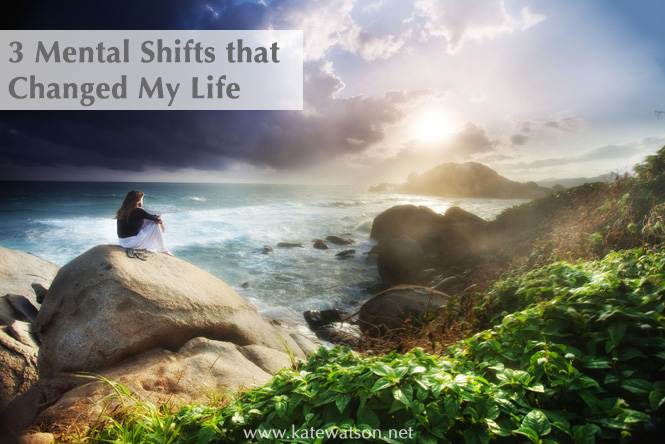











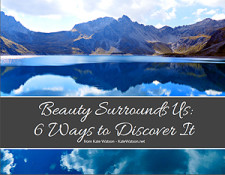
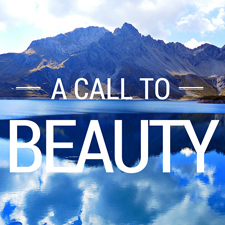
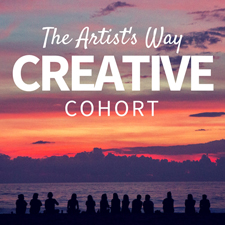
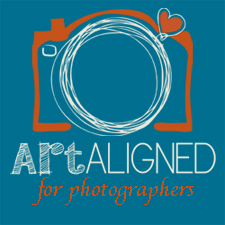






Kate Watson - Thanks, Aimee, for stopping by and leaving feedback!
aimee curley - this was beautiful Kate- THANK you!!!
My Pillars of Happiness » KateWatson.net - […] Express gratitude […]
Kate Watson - Thanks, Ariane! Happy you enjoyed it.
Kate Watson - Thanks, Cassandra! I know how you too have been working on those longstanding beliefs and I appreciate you sharing the experience with me. Glad to have you as part of my process, too!
Ariane - Beautiful post Kate!
Cassandra Rae - Way to go, Kate! It’s so liberating to notice and consciously change those deeply embedded thought patterns. Gratitude, presence, and love are powerful change makers. It’s inspiring to be a part of your process. Thank you!